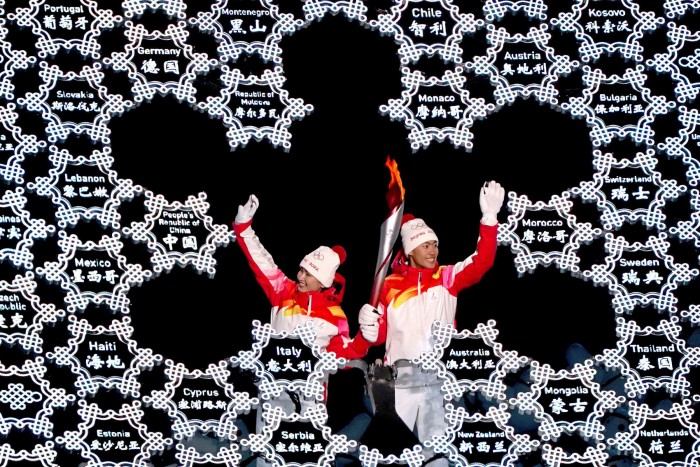One thing exceptional was unfolding on the ski slopes and ice rinks in and round Beijing because the Winter Olympics approached the top of its sixth day.
By Wednesday night, Chinese language athletes had pocketed three gold medals, trailing solely Norway and Sweden. Against this, their US counterparts, historically massive winners at winter sport competitions, had but to win a single occasion.
The rivals’ initially divergent fortunes have been mirrored within the performances of a few of their most hyped athletes. Whereas California-born Eileen Gu snatched a dramatic freestyle snowboarding gold for China within the massive air occasion, US champion skier Mikaela Shiffrin crashed out of two slalom occasions.
By Friday, the US had 4 golds, and China was seventh on the general medals desk.
President Xi Jinping mentioned earlier than the Video games opened on February 4 that he “didn’t care” what number of gold medals his nation received, however it seems that Chinese language athletes will surpass their document Winter Video games haul of 11 medals at Vancouver in 2010. When Beijing hosted the Summer season Olympics 14 years in the past, Chinese language athletes took residence 100 medals.

Not like the 2008 Summer season Video games, the Olympic venues this yr aren’t thronged with flag-waving Chinese language supporters. The coronavirus pandemic has pressured the Video games to be held inside a rigorously managed “bubble” designed to include any infections introduced into the nation by athletes and officers.
However there’s a palpable sense of pleasure as Chinese language athletes exceed expectations and Beijing’s genius for managing massive occasions is placed on worldwide show.
“I watched the opening ceremony and was actually moved when the Olympic rings rose up collectively,” mentioned Zai Ji’er, a Beijing resident in her mid-40s. “I’ve actually been wanting ahead to the Video games. Since 2008 our nation has gotten stronger, as everybody can see.”

Wang Yiwei, a world relations professor at Renmin College in Beijing, mentioned that internet hosting the Winter Olympics was consistent with “the Chinese language individuals’s craving for a greater life”.
“Increasingly younger individuals have begun to have interaction in winter sports activities,” Wang added. “It displays the truth that China is getting richer.”
“I ski nearly each weekend — I’m addicted,” mentioned Michael Jiang, a 27-year-old Beijing resident who lately took up the game. “I additionally love watching it, particularly freestyle, and I like Eileen Gu.”
Along with the early achievements of China’s athletes, Beijing may boast in regards to the success of the bubble, which had dissipated fears that the occasion would possibly spark an outbreak within the capital simply weeks earlier than the nation’s parliament convenes for its annual session in early March. An out-of-control outbreak in Hong Kong has demonstrated simply how tough it’s to remain forward of the fast-spreading Omicron variant.

On Friday Chinese language officers reported simply 11 new instances on the Video games, which opened on the identical day that the US demise toll from the two-year pandemic hit 900,000 in contrast with fewer than 4,900 in China.
On Tuesday, organisers mentioned they’d calm down restrictions to permit extra individuals from exterior the bubble to attend occasions, the place they sit in zones separated from these contained in the bubble. After the Video games end on February 20, Chinese language athletes, officers and employees should full three-week quarantines earlier than being allowed to return residence.
“China has the flexibility to mobilise overwhelming assets to ensure the Olympics runs easily,” mentioned Yun Solar, a China knowledgeable on the Stimson Heart in Washington. “Everyone knows the capability of [its] authoritarian authorities.”
The Chinese language authorities additionally struck a defiant notice through the torch relay, which included a Individuals’s Liberation Military soldier concerned in a conflict with Indian troops in 2020. The relay concluded with the cauldron being lit by Dinigeer Yilamujiang, an ethnic Uyghur cross-country skier from the northwestern area of Xinjiang.
Human rights critics have dubbed this yr’s Winter Olympics the “genocide Video games” due to the Chinese language authorities’s mass internment of Uyghurs over latest years.
“One has to assume they’d have anticipated that within the present political context, selecting a Uyghur athlete for the ultimate leg of the relay can be seen as an intentional assertion,” mentioned Susan Brownell, an knowledgeable on China’s sports activities system on the College of Missouri-St. Louis.
In keeping with Victor Gao on the Heart for China and Globalization, a government-affiliated think-tank in Beijing, the Chinese language authorities is now far much less involved about overseas criticism than it was in 2008.
“China was wanting to show itself on the 2008 Olympics,” he mentioned. “In 2022 China doesn’t must show something. China is what China is, prefer it or not.
Extra reporting by Emma Zhou in Beijing